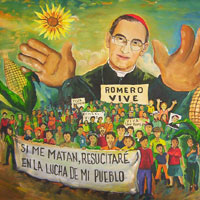God-seed of God the Sower
Today is the feast of Christ the King. It is a relatively new day on our calendar, first instituted by Pius XI in 1925 as something of a protest against the confiscation of the papal states by Italy.
But now this feast has little to do with any claim for temporal power on behalf of the Church. That sort of thing, these days, seems hopelessly antique.
Nevertheless, Christ reigns upon the earth: and this is a truth of faith. But what a paradox: is our age not a standing denial of this reign? Where is Christ in this age, which speaks so easily of secular progress?
Now the Church finds itself in a difficult and contradictory situation. But it has been like this for a long time. Was it easy, for instance, to proclaim the kingship of Christ at any point in the twentieth century? I think, for instance, of Stanford’s dramatic anthem For Lo, I Raise Up, written after the horrors of the First World War.

Charles Villiers Stanford
For, lo, I raise up that bitter and hasty nation,
Which marches through the breadth of the earth,
To possess the dwelling places that are not theirs.
…
Their horses … are swifter than leopards,
And are more fierce than the evening wolves. …
Where is God in all this madness? The answer comes with unexpected serenity:
But the Lord is in his holy temple:
Let all the earth keep silence before Him.
We proclaim Christ’s reign in a mystery, even as the world goes on its bloody and futile way. So it was also anciently: it was not easy, for instance, for St Augustine to proclaim the city of God when Rome was falling. Yet, to the eyes of faith, Christ breaks forth in a thousand sacraments. The martyred one shines forth; his self-sacrificial humanity appears. He comes to us in the breaking of bread. He comes to us wherever there is self-sacrificial love.
2.
This reign is not like the lordship of Caesar. The kingdom has not been established by irresistible force: God is powerful enough to be vulnerable. After all, it is we who need to be changed, over the long course of history. It is we who need to learn to subdue fear and greed: we need to learn how to nurture the seed of God.
 It will, I think, help us to remember that Jesus also proclaimed the reign of God as a mystery. It was a dimension of reality which was known only by those who have “eyes to see and ears to hear.” Jesus speaks of it in parables: in order that it should be perceived only by those who are worthy of it.
It will, I think, help us to remember that Jesus also proclaimed the reign of God as a mystery. It was a dimension of reality which was known only by those who have “eyes to see and ears to hear.” Jesus speaks of it in parables: in order that it should be perceived only by those who are worthy of it.
The reign of God, he said, is even like a tiny seed planted in the heart—vulnerable to the birds that swoop down to peck and pluck away; it is threatened by the thorns of angst and greed.
It is a vulnerable reality, an ambiguous reality at times.
The kingdom is, I want to suggest, an interior vision—instilled, like a seed of God, in the heart. It is not something we ourselves have planted; it was planted by Another. And it grows up while we sleep, by another power. It is the beginnings of something more, something new; it stirs us beyond secular disenchantment, even to the completion of history. This is the seed of God, which grows up by the light of trust. It is something like an artistic vision, a sacred imagination—the desire of peacemakers, of artists, of poets, of contemplatives of all kinds. As Elaine Wainwright has said, the reign of God is “the dream of God” within us.
God reigns in the secret place of the heart.
3.
We nurture seeds; we till the good soil of our heart. Yet we do not do everything; we work always as co-creators with God, the Life of all.
I recently learnt of this reflection by Oscar Romero, on our struggle:
We accomplish in our lifetime only a tiny fraction
of the magnificent enterprise that is God’s work.
Nothing we do is complete, which is a way of saying
that the kingdom always lies beyond us.
No statement says all that could be said.
No prayer fully expresses our faith.
No confession brings perfection.
No pastoral visit brings wholeness.
No program accomplishes the church’s mission.
No set of goals and objectives includes everything.
This is what we are about.
We plant the seeds that one day will grow.
We water seeds already planted,
knowing that they hold future promise.
We lay foundations that will need further development.
We provide yeast that produces far beyond our capabilities.
We cannot do everything, and there is a sense of liberation
in realizing that. This enables us to do something,
and to do it very well. It may be incomplete,
but it is a beginning, a step along the way,
an opportunity for the Lord’s grace to enter and do the rest.
We may never see the end results, but that is the difference
between the master builder and the worker.
We are workers, not master builders; ministers, not messiahs.
We are prophets of a future not our own.
Amen.
Chris Tyack

